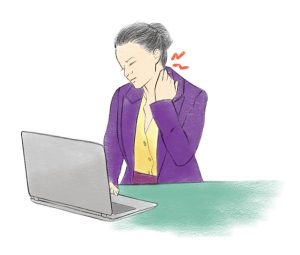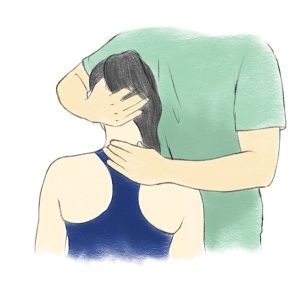Pain Management: Neck Pain and Headache
Under the large umbrella of pain management, one of the most common reasons patients seek help is for neck pain. The main symptoms are discomfort and pain in the neck region, radiating pain and tension to the shoulders, or tingling sensations along the arms down to the hands. Most episodes of neck pain are due to muscle or soft tissue strain, but can also be caused by sudden force like whiplash. If neck pain persists or worsens, there is often a specific condition that requires diagnosis and treatment, such as degeneration of the cervical vertebral discs, herniation of the discs, or narrowing of the cervical disc space.

Pain Evaluation
There are two main types of pain we look at:
Acute: sudden onset, short duration, pain that is directly related to soft tissue damage that will gradually resolve as the tissue heals
Chronic: any pain that lasts for more than three months, can become progressively worse and reoccur intermittently
We will start by taking a thorough history to learn about and evaluate your medical background and determine the type of neck issue involved. We will ask you to describe your neck pain and will gather information such as your occupation, lifestyle, posture, sleep habits, recent injuries and old injuries. Your doctor takes a complete history to better understand the nature of your pain, such as if the pain is worse at certain times of the day or is aggravated by temperature changes or certain activities.
A physical examination is then carried out where the neck is observed and palpated to feel for any abnormalities and tenderness. The arm and hand are then tested for weakness, reflexes and sensation. We check head and neck range of motion to note whether you can achieve normal movement with ease or if certain movements cause pain or struggles.
If your practitioner suspects any chance of nerve compression, they will do further physical exams testing for weakness, muscle power and sensation to check neurologic status. This helps narrow the list of likely diagnoses and determine the next course of action. As part of the evaluation, the doctor may request diagnostic testing, such as an X-ray or MRI, for more information about underlying medical causes.
With results from this thorough diagnostic process, the doctor devises a plan and addresses each symptom with various tools.
Holistic Pain Management: Neck Pain Treatment
Acupuncture is highly effective for neck pain. It reduces tension and alleviates numbness and tingling sensations, nausea, headache, dizziness and other symptoms. The doctor will target the acupuncture points based on the symptoms that need to be addressed, the patient’s health condition and the category of neck pain. The points may be around the area of pain, or further away along key meridians (distal points).
Herbal medicine can also be effective for many of the effects the patient may be suffering from the neck pain. For example, if the patient is having trouble sleeping or if pre-existing symptoms inhibit their daily life and work, the TCM doctor could prescribe herbal remedies to help alleviate and improve the condition.
Medical massage/tuina will provide some relief in many cases, if indicated by the symptoms and any results from X-rays or MRIs. Chiropractic can address any spinal issues such as realigning and working toward a naturally curved cervical spine. Physiotherapy to improve strength and flexibility and correct the posture can also help with short and long-term improvement. Osteopathy can relieve tension in the underlying tissues and overcompensating muscle groups.

Neck Pain and Headache
Many patients with cervical spine problems also suffer from headaches. Similar to neck pain, the practitioner will evaluate the type of headache to form a treatment plan.
The location of the headache, as with neck pain, relates it to a specific meridian/organ system in TCM:
1. Forehead: yang ming (stomach meridian)
2. Temporal lobe (both sides of head): shao yang (gallbladder meridian)
3. Parietal lobe (top of head): jue yin (liver meridian)
4. Occipital lobe (back of head): tai yang (bladder meridian)
This instructs the practitioner on which herbs to use and which meridians and points to target in acupuncture treatment.
A large body of evidence has demonstrated acupuncture’s effectiveness for treating headaches and other kinds of pain. In recent years, well-known western medical organizations and journals have confirmed the evidence for acupuncture with control studies and reviews. For example, JAMA (Journal of the American Medical Association) published this study which concluded “acupuncture was superior to both sham and no-acupuncture control for each pain condition”.
Body & Soul is the top pain management and rehabilitation provider in Shanghai, offering highly trained and specialized TCM experts as well as chiropractic, osteopathy, physiotherapy and complementary therapies. Don’t live in pain. Come in to get your neck pain or headache evaluated and explore natural, effective remedies. With our integrative approach, many patients find solutions where others have failed in the past.
Marla offers TCM evaluation and treatments in the Hongmei Road (Minhang) and Century Park (Pudong) clinics. Click here to make an appointment with her or any of our pain management practitioners.
